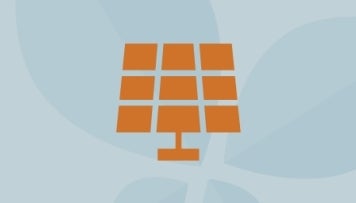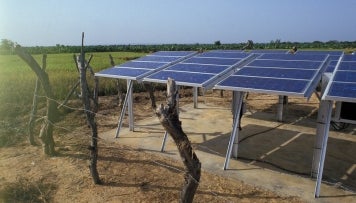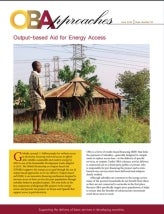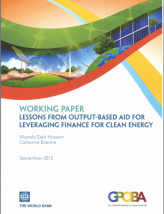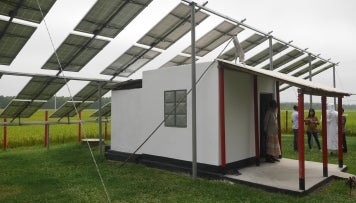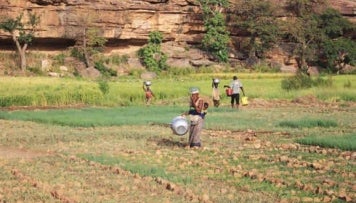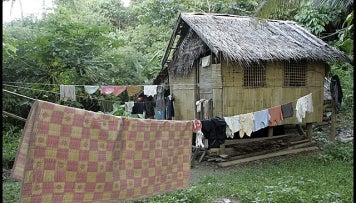
Photo: Saul E Gonzalez / World Bank
Despite increases in access to electricity over the last two decades, approximately 1.1 billion people—still lacked access to electricity in 2014. While urban areas tend to be more electrified due to their proximity to grid connections, most of the world’s population without access to electricity lives in rural areas.
The Sustainable Development Goals adopted in 2015, strives to have universal access to affordable, reliable, sustainable and modern energy for all by 2030. The Global Partnership on Output-based Aid (GPOBA) supports this energy access goal using innovative financing solutions that link funding to actual results achieved. Results-based Financing (RBF) approaches provide access to basic services like energy for low-income families and communities that might otherwise go unserved.
Experience from GPOBA work suggests designing subsidies focusing on results encourages efficiency through good targeting of subsidies and creating incentives for Service Providers to deliver in a timely manner and at lowest cost. Therefore, by bringing together public and private sector funders to maximize resources, and designing effective incentives for service providers to reach underserved low-income communities, results-based financing approaches can give people the chance to improve their life.
GPOBA has been supporting projects using renewable energy to expand access to low-income communities since 2005 and has achieved results and lessons that are being used to design similar projects in different countries.
In Bangladesh, GPOBA has partnered with the Government of Bangladesh, the Infrastructure Development Company Limited (IDCOL) and other donors to increase access to clean energy for targeted rural areas through different renewable energy technologies. The project makes clean energy affordable to low-income households through off-grid solutions by buying down the capital cost of solar home systems (SHS) and mini-grid connections and facilitates investments in solar-pumped irrigation to farmers, reducing the negative fiscal and environmental impact of diesel pumps. While the solar-based aspect is the main feature of this project, the grant also helps improve family health by providing clean cooking solutions through biogas plants. The project has already impacted the lives of 3.6 million beneficiaries in Bangladesh and has served as a lesson for many other countries.
In Mali where the rural population remains dispersed, extending the national electricity grid in a financially sustainable manner is a major challenge. GPOBA grant has been used to co-finance Mali’s Rural Electrification Hybrid System Project, which provides incentives to private operators to increase access and make connection packages affordable to the rural and low-income communities using mini-grid and Solar Home System technologies.
Another project in the Philippines supports low-income families in remote and conflict affected areas of the country to have access to solar energy under the Access to Sustainable Energy Project. The project is implemented in partnership with the Department of Energy of the Philippines and the European Union. The project, implemented by the private LGU Guarantee Corporation, in partnership with Electric Cooperatives, selects private contractors to supply and install the solar home systems (SHS) and GPOBA funds disburse upon verification that SHSs have been installed and are functioning.
A recent impact study conducted to analyze the impact of improved access to energy shows that SHS adoption leads to welfare gains, such as: saving money, improving meal preparation conditions, reducing incidence of gastrointestinal and respiratory diseases, expanding study time for children, increasing mobility and security, and allowing more efficient use of time for women.
Related (useful) links
Output-Based Aid for Energy Access (OBApproaches 52)
Bangladesh Rural Electrification and Renewable Energy Development- SHS Project (Lessons Learned 10)
Surge in Solar-Powered Homes Experience in Off-Grid Rural Bangladesh
Output-Based Aid in Bangladesh: Solar Home Systems for Rural Households (OBApproaches 42)
Output-Based Aid in Mali Rural Electrification Hybrid System Project (OBApproaches 45)
